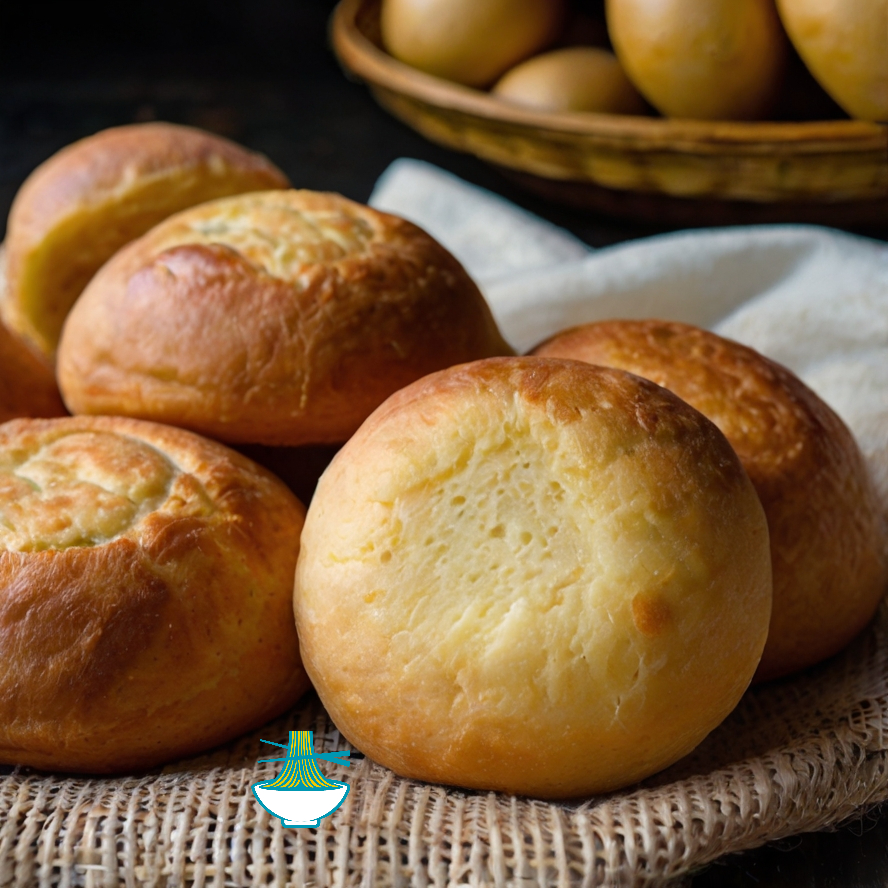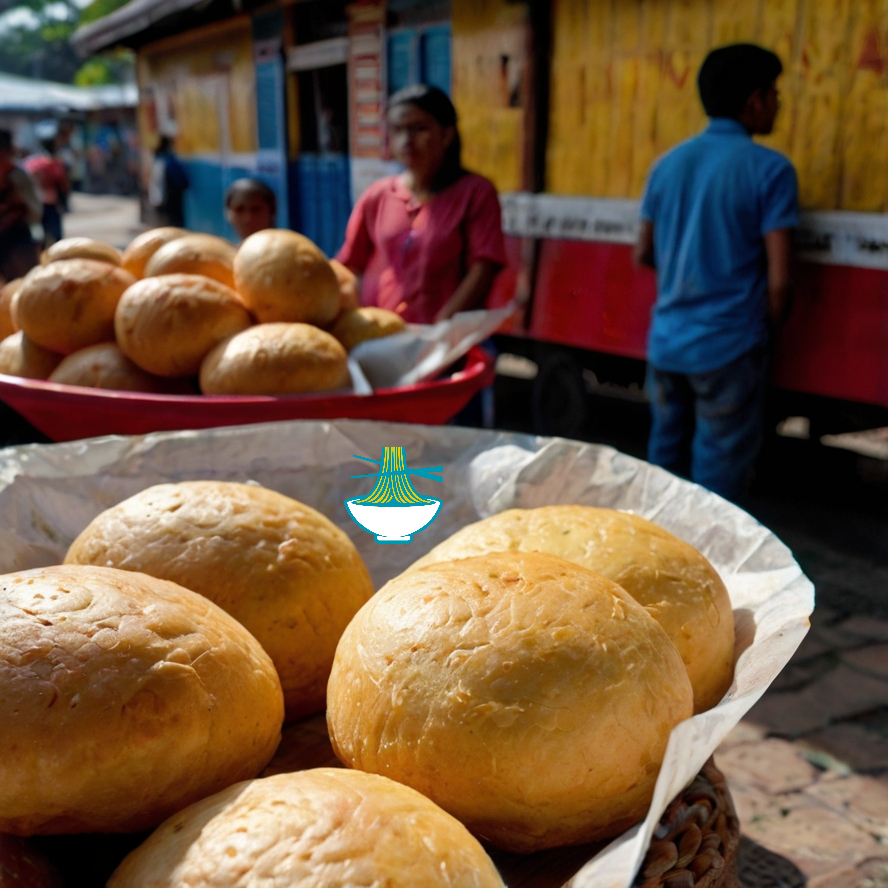Pandebono is a cherished Colombian cheese bread, notable for its gluten-free nature and deliciously unique texture. Made with pre-cooked cornmeal, cheese, and yuca starch, this traditional snack boasts a slightly chewy interior and a crispy exterior. The cheese imparts a savory, tangy flavor that pairs beautifully with coffee or hot chocolate. Versatile in its uses, pandebono can also be transformed into a sandwich bun or stuffed with various fillings for an appetizer.

Pandebono originates from the Valle del Cauca region in Colombia, where it has been a staple for generations. Its creation dates back to the early 20th century, reflecting the region’s rich culinary heritage. The combination of indigenous ingredients such as yuca and European influences like cheese exemplifies the fusion of cultures that characterize Colombian cuisine. Over time, pandebono has become a beloved snack throughout Colombia, enjoyed during breakfast, as a mid-day treat, or alongside a warm beverage.
Ingredients:
- 2 cups pre-cooked cornmeal
- 1 cup grated cheese (queso blanco or feta)
- 1 cup yuca starch
- 1 egg
- 1/4 cup milk
- 1/4 cup vegetable oil
- 1/2 teaspoon baking powder
- Salt to taste
Instructions:
1. Preheat Oven: Set your oven to 350°F (180°C).
2. Mix Dry Ingredients: In a large bowl, combine cornmeal, cheese, and yuca starch.
3. Add Wet Ingredients: Stir in the egg, milk, and vegetable oil until well incorporated.
4. Add Leavening: Mix in the baking powder and salt.
5. Form Dough: Knead the mixture by hand until smooth and pliable.
6. Shape: Divide dough into golf-ball-sized portions.
7. Prepare for Baking: Place the balls on a parchment-lined baking sheet, spacing them to allow for expansion.
8. Bake: Cook for 20-25 minutes, or until golden brown.
9. Cool and Serve: Let the pandebono cool slightly before serving.
Note: Best enjoyed warm, pandebono can be stored in an airtight container for up to three days. Reheat in the oven for optimal freshness.

Nutrition Value:
1. Pre-cooked Cornmeal (2 cups)
- Calories: Approximately 560
- Carbohydrates: 120 grams
- Protein: 8 grams
- Fat: 2 grams
- Sodium: 0 milligrams
- Cholesterol: 0 milligrams
- Vitamins: Contains vitamin B6, folate
- Minerals: High in iron, magnesium, and phosphorus
Nutritional Benefit: Pre-cooked cornmeal provides a significant amount of complex carbohydrates for sustained energy. It is also a good source of iron and magnesium, which are essential for oxygen transport and muscle function.
2. Grated Cheese (queso blanco or feta) (1 cup)
- Calories: Approximately 300
- Carbohydrates: 4 grams
- Protein: 20 grams
- Fat: 24 grams
- Sodium: 800 milligrams
- Cholesterol: 80 milligrams
- Vitamins: Rich in vitamin A, vitamin B12
- Minerals: High in calcium and phosphorus
Nutritional Benefit: Cheese is a major source of protein and calcium, crucial for bone health and muscle function. It also provides vitamin A for vision and immune function.
Yuca Starch (1 cup)
- Calories: Approximately 330
- Carbohydrates: 80 grams
- Protein: 0 grams
- Fat: 0 grams
- Sodium: 0 milligrams
- Cholesterol: 0 milligrams
- Vitamins: Minimal vitamins
- Minerals: Contains potassium and magnesium
Nutritional Benefit: Yuca starch provides a significant amount of carbohydrates for energy. It also contributes to electrolyte balance due to its potassium content.
4. Egg (1 large)
- Calories: Approximately 70
- Carbohydrates: 1 gram
- Protein: 6 grams
- Fat: 5 grams
- Sodium: 70 milligrams
- Cholesterol: 186 milligrams
- Vitamins: Rich in vitamins B12 and D
- Minerals: Contains selenium and iodine
Nutritional Benefit: Eggs are a high-quality protein source and provide essential vitamins and minerals. They are important for muscle repair and immune support.
5. Milk (1/4 cup)
- Calories: Approximately 30
- Carbohydrates: 2.5 grams
- Protein: 1.5 grams
- Fat: 1.5 grams
- Sodium: 30 milligrams
- Cholesterol: 10 milligrams
- Vitamins: Contains vitamin D and B12
- Minerals: Good source of calcium and potassium
Nutritional Benefit: Milk adds calcium and vitamin D, which are important for bone health. It also provides a small amount of protein and carbohydrates for energy.
6. Vegetable Oil (1/4 cup)
- Calories: Approximately 240
- Carbohydrates: 0 grams
- Protein: 0 grams
- Fat: 27 grams
- Sodium: 0 milligrams
- Cholesterol: 0 milligrams
- Vitamins: Contains vitamin E
- Minerals: Minimal minerals
Nutritional Benefit: Vegetable oil provides essential fatty acids and vitamin E, which support skin health and cellular function.
7. Baking Powder (1/2 teaspoon)
- Calories: Approximately 0
- Carbohydrates: 0 grams
- Protein: 0 grams
- Fat: 0 grams
- Sodium: 500 milligrams
- Cholesterol: 0 milligrams
- Vitamins: Minimal vitamins
- Minerals: Contains sodium
Nutritional Benefit: Baking powder is used as a leavening agent to help the bread rise. Its sodium content should be considered when monitoring overall sodium intake.
8. Salt (to taste)
- Calories: 0
- Carbohydrates: 0 grams
- Protein: 0 grams
- Fat: 0 grams
- Sodium: Varies based on amount used
- Cholesterol: 0 milligrams
- Vitamins: Minimal vitamins
- Minerals: High in sodium
Nutritional Benefit: Salt is essential for flavor and can help regulate fluid balance in the body. However, it should be used in moderation to avoid excessive sodium intake.


Comments